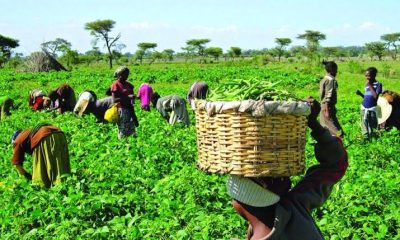Business
Rising Cost: The Production Capacity Of Nigerian Farmers May Drop By 2025 – Babachir Lawal Warns

Former secretary to the government of the federation (SGF), Babchir Lawal has warned that the rising cost of food production could limit Nigerian farmers production capacity in 2025.
Naija News reports that Lawal, who is also a farmer, issued this warning in response to the rising food inflation, stating that farmers were currently dealing with growing production costs, which could eventually affect the price of food items in the future.
His warning comes as Nigerians continue to protest the rising cost of living in recent months. Many believe that the move by the President Bola Tinubu led government to remove fuel subsidy and unify the country’s exchange rate is responsible for the increased hardship.
In recent days, there have been demonstrations in parts of the country over the prevalent economic hardship and rising cost of living.
The former SGF said that, while there is plenty of food on the market, Nigerians’ purchasing power is insufficient to cover the costs of basic necessities.
Speaking in the light of the increased protests that have hit parts of the country Lawal warned that farmers may be forced to reduce their production due to the high cost of purchasing needed equipment such as tractors, fertilisers, and diesel.
He said, “This thing (protests) we are facing now, it is not because of lack of food items in the market. There is abundance of food items in the market. What is lacking is the money with which to purchase it. This is because the money in our pocket has lost its value.
“If last year, I bought five mudus of garri, today, that same amount can only buy you one mudu. So, the food is there but the money is not there to purchase it.
“Next year, what will happen is that the food will not be there. I am a farmer, a very big-time farmer and I know what I am saying. I spend about three drums of diesel every week during the planting season for my tractors, bulldozers and other vehicles.
“Now, a drum of diesel delivered to my village cost me N380,000 as opposed to N180,000 last year. With this increment, will I be able to afford sufficient diesel for five tractors, two bulldozers, one excavator, and six delivery trucks next year? The consequences might be I will have to reduce the size of my farm.
“Look at fertiliser for example, the highest price last year was N25,000 to N27,000 for NPK- 20 1010. This year, I went to the market to see if I start buying my fertiliser early, the price is now N37,000. So, if last year, I was able to buy fertiliser to cultivate 2,000 hectares of cotton, this year, based on the price, I will have to restrict myself to 100 hectares because I will not have enough money to buy sufficient fertiliser.
“All these price increases will affect the quality and quantity of harvests next year. So, next year, you might enter the market and the cost of food items has doubled because of the production costs. Next year, the problem will be compounded. I can assure you of this as a farmer.
“Food will be scarce because farmers will be unable to produce sufficiently and therefore, supply and demand price will have to increase.”








